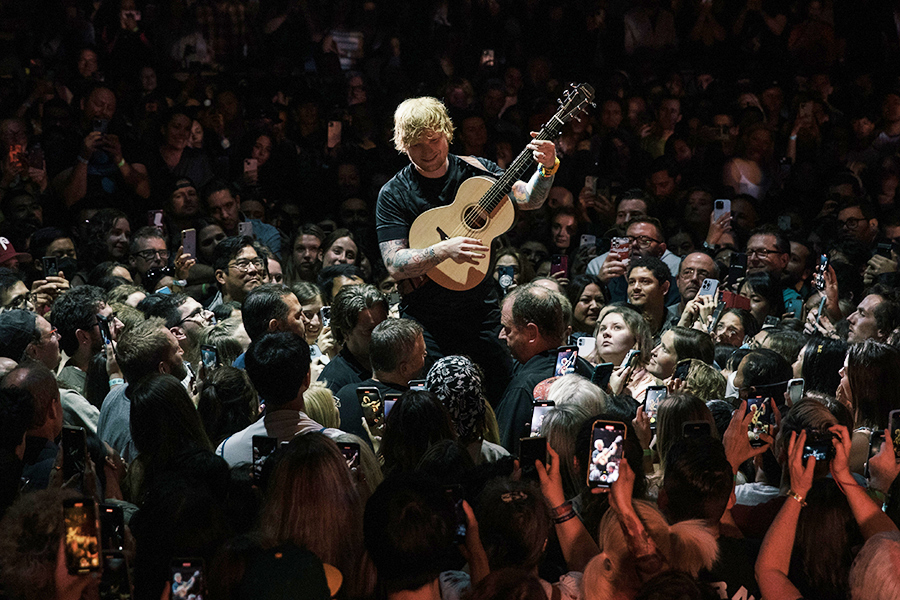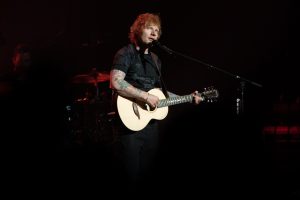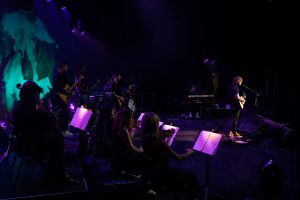REVIEW: Ed Sheeran shares his grief at intimate Subtract Tour gig at the Fox

Ed Sheeran performs during a Subtract Tour club show at Fox Theater in Oakland on Sept. 15, 2023. Courtesy Mark Surridge.
OAKLAND — Going on two tours simultaneously may have initially raised some eyebrows, but there’s a clear reason pop star Ed Sheeran separated his stadium Mathematics Tour (+–=÷×) from the much more intimate Subtract Tour. The latter, which hit Fox Theater on Friday ahead of his much-hyped show at Levi’s Stadium, focuses on his May release, a collection of 14 mostly tearjerking sad songs about the death of his best friend and his wife’s cancer diagnosis that both occurred in February 2022.
The more than two-hour performance offered two sets without a break, with the first consisting of Subtract from front to back, backed by a full band and six-member string section.
“If I finished this song and fireworks went up, you would be [confused],” Sheeran said of opener “Boat,” explaining why the Subtract songs don’t fit into the party atmosphere of a stadium show. “You’re going to be very sad in this hour. And the next hour is called ‘happy hour.'”
This first set actually took over an hour, as Sheeran went into great detail about the inspirations of most of the songs, his head space as he was writing and what was going on in his life at the time. He was writing in grief and depression. February is his birth month, and he was hit with the devastating news his best friend, Jamal, had suddenly died; his wife, then pregnant with their second daughter, was diagnosed with his cancer—and oh yeah, it was also when he was sued for copyright infringement (a case he later won).
With his band staged in a large semi-circle behind him, he explained how he was initially stuck in denial, not coming to terms until he was shoveling dirt onto the casket. That informed the first couple of songs, including “Salt Water,” which had a Nashville sound: folky but rich and full. None of these first 14 songs sounded sparse.
“See, I told you you would be sad,” he said afterward.
Wistful single “Eyes Closed” was the most poppy of the bunch but was anything but happy. Same for “Life Goes On,” which had the keyboardist playing some pedal-steel-sounding wails.
“When Jamal died, I wanted the world to stop—like for the queen,” he said of the song. “I thought it was the most respectful thing. My world stopped. … It’s been well over a year now, and my world is still stopped, but life keeps rolling.”
Sheeran then turned his attention to his eldest daughter, then a toddler, who continued to bring joy into his life even when he came home drunk and sad late at night by waking him up early (as kids do; it’s a thing) and demanding his attention. They started listening to his vast record collection (turns out he’s a big Slipknot fan), and so the symphonic “Dusty” is about listening to Dusty Springfield with her.
Nearly every song came with a story, and Ed Sheeran was able to weave the stories together with a clear beginning, middle and end even though he was playing the songs in their album order. The Southern-rock-edged “End of Youth” was about him feeling that his youth officially ended with the death of Jamal. In a way, he expressed gratitude that his youth lasted as long as it did, because many of us lose friends or parents much earlier.
The waltz-like “Colourblind,” a reprieve at the end of Side A of the album, was inspired by his parents’ nearly 40-year marriage. But soon after, he was back to “the misery.” He explained that when he played these songs the first few times, be cried on stage, but with repetition he started giving the songs away for listeners to reinterpret them, as well as letting go of some of his pain. And the other reason for performing them in these intimate settings?
“No one is pumping weights to these songs. No one is getting ready for a night out with their friends,” he said. “Seeing people connect with these songs is how I see people like these songs.”
The next set of songs centered on his wife’s cancer diagnosis that came at a dangerous time and created worry that they were going to have to force a premature birth for his wife to start treatment. Fortunately, doctors later determined that the cancer was operable, which could be delayed until after birth. The songs included the symphonic “Spark” and piano ballad “No Strings,” about making a promise that if they could survive 2022, the couple could survive anything.
Ed Sheeran then concluded the first part of the show with album closer “The Hills of Aberfeldy,” which he explained he initially wrote in 2012 for a long-gestating acoustic album that was to be called Subtract from the outset. It clearly stood out from the others as an Irish folk song with one of the violinists magically transforming her instrument into a fiddle. He shook each of his band members’ hands as they exited for the rest of the show.
The next segment of the show had Sheeran returning to his roots as a looping one-man band for some of his biggest hits like “Shivers” and “Bad Habits” (both from 2021’s Equals), as well as “Thinking Out Loud” and “Shape of You.” Attendees were finally free to get raucous, sway their arms and sing along, which they did loudly.

Ed Sheeran performs during a Subtract Tour club show at Fox Theater in Oakland on Sept. 15, 2023. Courtesy.
Sheeran has yet another album on the way in a couple of weeks, Autumn Variations, and the next batch of songs provided a taste of what’s to come: Traditional singer-songwriter faire inspired by the lives of people his life. For this part of the show he politely implored for people to put their phones away and to police each other, because he wants to keep the songs private until their release.
Other than one pocket of noise, the room was completely silent for soft fingerpicked ballad “Head > Heels.” It just so happened to be that noise was caused by people trying to stop someone from filming. It was noticeable enough for him to later tell people not to be so aggressive about policing themselves.
Following the gently strummed “Blue,” he debuted a song he said he hadn’t played live yet, “The Day I was Born,” a country-ish tune about a friend whose birthday always gets forgotten. Next came “Magical,” a strummed love song he called his favorite on the forthcoming album.
“This is how it feels to be in love,” he softy sang.

Ed Sheeran performs during a Subtract Tour club show at Fox Theater in Oakland on Sept. 15, 2023. Roman Gokhman/STAFF.
He performed “American Town,” an uptempo tune, and Irish traditional tune “The Parting Glass,” and completely unplugged after climbing into the crowd. He had his team record the former in order to post it online the same night—which of course meant that he flubbed it up multiple times in an endearing sort of way.
Singer-songwriter Ben Kweller opened with a short solo set of folky tunes like “Run,” “On My Way” and the rowdier “Things I Like to Do.” He emphasized the comedic timing in his songs with well-placed lines about being in the Bay Area and about Sheeran. Kweller switched from guitar to piano for “Falling” and “Thirteen.”
“Are you ready?” he asked before blowing a longing blast through a harmonica on the latter.
For his loudest song of the night, “American Cigarettes,” the audience cheerfully went along with his call-and-response during the chorus.
Follow editor Roman Gokhman at Twitter.com/RomiTheWriter.


